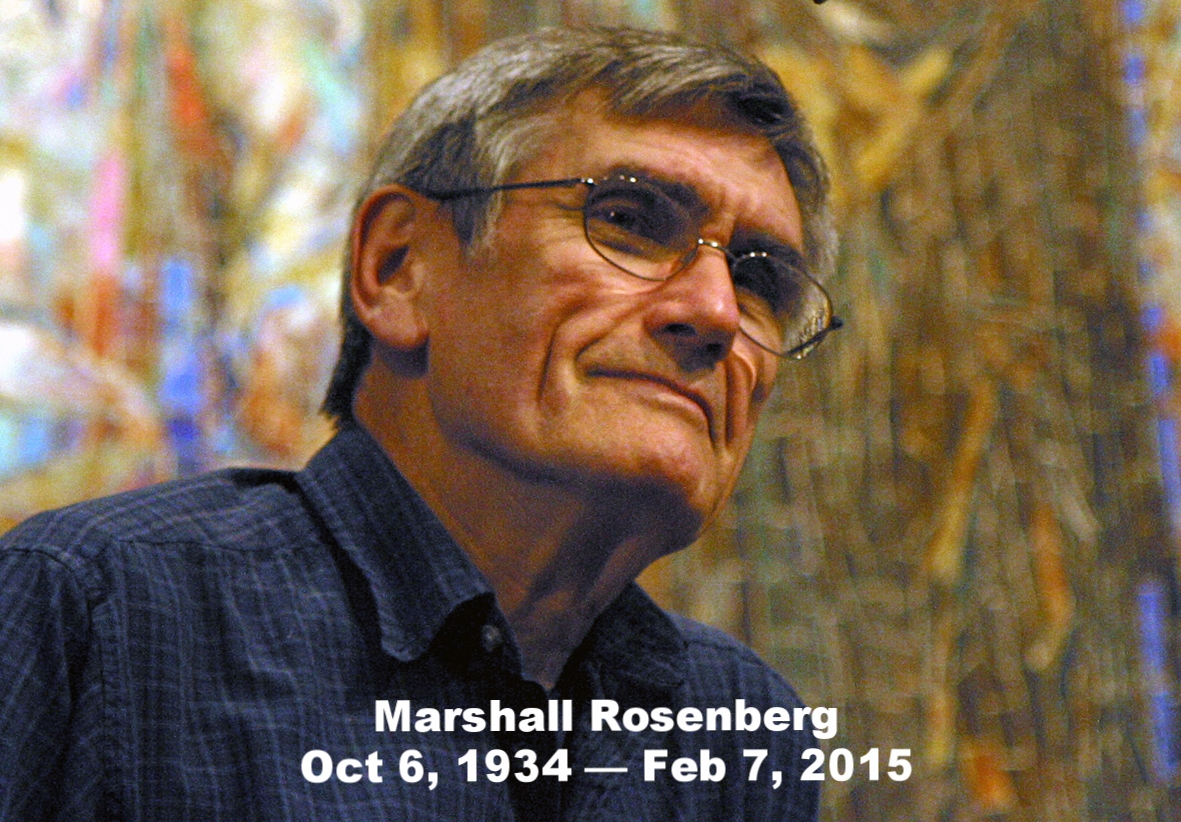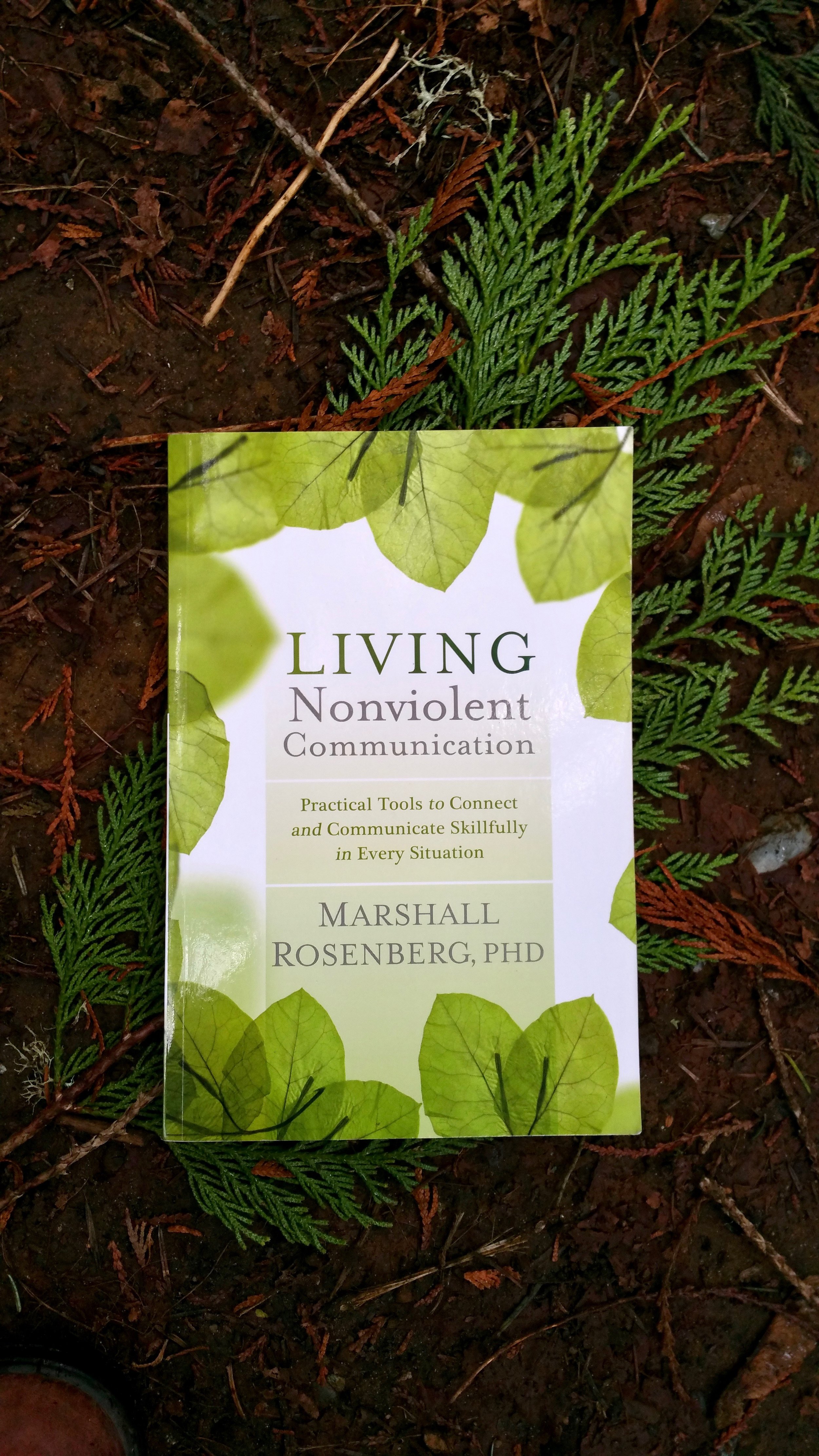Keeping Marshall Rosenberg's Work Alive
One of the things that strongly stood out for me when visionary, teacher and author Marshall Rosenberg spoke was that he planted most of what he said within a larger socio-cultural context. Even when he engaged in role plays focusing on personal relationship challenges volunteered by audience members, one could recognize a broader landscape informing his responses. His concern was not solely with the interpersonal breakthroughs that people might experience by learning the NVC process but equally, and perhaps even more so, he was concerned with the questionable merit of the systemic structures shaping and directing people’s lives. It was never left out. He would regularly make statements during his workshops like:
We’ve been educated by the culture to enjoy violence.
We have been educated to play the game who’s right.
When people live inside domination systems, they learn domination thinking.
We are educated to forget our natural way of being.
We've been educated to think in a way that turns people into enemies.
The most dangerous of all behaviors may consist of doing things because we're supposed to.
As author Neil Postman said, everyone needs a good bullshit detector.
Can you imagine a more diabolical concept than punishment as a way to educate people?
Don’t be a nice dead person.
I received a doctorate in professional jackal/alienation (referring to his Ph.D in clinical psychology).
Read John Taylor Gatto “The Hidden Curriculum of Compulsory Schooling”.
The only purpose I see in grades is to maintain a caste system in our society and hide it as a meritocracy or a democracy.
I choose not to participate in any evaluation scheme that differentiates on the basis of race or colour.
Research shows that the more grades are given, the more students lose perspective on the worth of what they’re learning. So then they learn not for the value of what they’re learning but for the extrinsic rewards.
The purpose of a “jackal” (aka life alienating) culture is to get people used to working for extrinsic rewards like salary so they’ll be able to pollute the environment or do anything else as long as their boss tells them to do it and get their reward .. so that’s what you want to train them for in the schools.
I compare most schools to doing "soft time" in prison.
People do not make good slaves when they're connected to life. That's why in the public schools the primary objective is obedience to authority.
When I was in school, my teachers told me that I would one day be glad that I had gone to school. Well I’m now close to 70 and I’m still waiting.
Read the work of anthropologist Ruth Benedict whose research shows that not all cultures are domination cultures.
Read the work of theologian Walter Wink. In “The Powers That Be”, Wink states that violence has been the social norm for several thousands of years during which time humans have been oppressed and been trained to serve and maintain domination systems.
Consumerism makes people think that their needs will be met by owning a certain item.
We’ve been playing the game Punitive God for several centuries.
Read “Punished by Rewards” by Alfie Kohn to see how we train children to become complicit in domination systems
Read Riane Eisler’s “The Chalice and the Blade” to learn about what history teaches us about people living in harmony with each other and the earth.
Gene Sharp wrote a wonderful article titled “198 Applications of Nonviolent Force.” He shows how, throughout history, nonviolence has been used to prevent violence and to protect, not to punish.
Rather than educating people to be conscious of their needs, we teach them to become addicted to ineffective strategies for meeting them.
Never pay money for anything and never charge money for anything. Transform the concept of worth .. get it out of your head that anything is worth a certain amount of money.
Read what Genevieve Vaughan writes about gift economy.
These statements (some from memory and others from transcripts and videos) represent but a small sampling of the many references Rosenberg made both to education and to culture. They reveal the thinking of a visionary and social critic encouraging his listeners to consider the dehumanizing influences that dominant culture values have had and continue to have on human beings, on human culture and on life itself. He suggests quite emphatically that it leads people to act in ways that are tragically alienating and undermining to human nature.
“What conditions, both external and internal, interfere with people’s natural capacity to be connected to life and to respond humanely in challenging moments? ”
One might say that Rosenberg’s question is less “how can people become more compassionate?” but rather, “what conditions, both external and internal, interfere with people’s natural capacity to be connected to life and to respond humanely in challenging moments?”
The two questions may appear to be near twins at first glance but they are likely to stimulate different responses and outcomes. The first question will typically prompt people to look inwardly for ways to increase their capacity to respond compassionately. The understanding in this case is that personal, psychological or spiritual work will yield the sought after result. For instance, it’s in vogue these days to teach meditation as a practice to help people become more compassionate. It’s also fashionable to cite scientific research identifying neurological and brain related factors that may inhibit compassion.
While these approaches are not without their benefits, their focus on the individual does not address the larger systemic issues that Marshall refers to time and time again. The fact that people learn to manage and lower their reactive impulses during stressful moments does little to change the dehumanizing effects of the culture itself. It merely makes for a less reactive and more accommodating population. It may in fact be just what the “systemic machine” wants .. that people learn how to self soothe while being subjected to an increasingly dehumanizing regime.
The second question on the other hand of what interferes with people’s natural capacity to be connected to life draws attention to the questionable humanity of the systemic structures that inform our lives. It’s actually a much harder question to wrestle given the longevity and well established momentum of those structures, as well as the fact that most of us were born into these structures and have a hard time pointing to what might be described a real suffering given that we also benefit in a myriad of ways from what is made available to us by virtue of those structures being in place.
Take for instance the advent of smart phones. It’s commonplace to see families dining at home or in restaurants where the children, anywhere from 5 ages and up, are singularly focused on their hand held devices as their parents either speak to each other or are similarly engaged with devices. No one seated at that table is “suffering” per se and yet each is plugged into a social and cultural narrative that was less designed by them than it was designed by technology driven corporations wanting to make a profit.
The manner in which today’s families gather around the communal table is far from benign. The consequences of being more captivated by a cold wireless device than by the conversation of kin seated right next to us is regarded by some experts in the fields of psychology and sociology as being catastrophic over the long term. The device that is intended to meet needs for connection ironically fails miserably at meeting that very need .. at least in the long run.
I highlight this scenario so common to our technological world because it’s hard to appreciate the long term consequences of conveniences and pleasures that are so immediately satisfying. For all we can tell, no harm is being done. It seems after all that everyone is having a fairly agreeable time. And perhaps that should alert us .. because what appeals to us in many instances is not necessarily good for us.
I have heard it said from those who were close to Marshall in his later years that he mourned the fact that NVC was not propelling the social change that he had hoped for. One can see how this might be the case when the initial attraction to NVC for so many people is rooted in a desire for personal healing and self-improvement. I confess it was certainly the case for me. Audiences often saw in Marshall a man who exemplified the ideal father or friend as well as the respected wise teacher. He was like the old growth tree in the forest that you could run to and tell your secrets to knowing that the tree had decades over you and would listen to you and provide support as you leaned in close. He exuded a unique and compelling blend of calm, warmth, discernment, attentiveness, human concern and deep abiding wisdom.
One could just as easily be drawn to him by a desire for "healing" in their life as by a desire to learn skills from him. And perhaps at times the latter would be eclipsed by the former. Understandably. So many of us have not been seen or heard in the way that would have best served us in our youth which has cost us enormously personally and culturally.
The thing is, personal healing rarely leads to cultural or social healing, whereas attention placed on establishing socio-cultural health has a good chance of addressing the conditions that are often at the root of personal suffering.
If a person’s primary objective in learning NVC is to increase the likelihood of getting their needs met, then most probably social change at the level that Rosenberg was envisioning is not likely. Even if a person is motivated by a desire to live in a world where everyone’s needs are fully valued, I predict that the social change that Rosenberg had in mind is just as unlikely.
I say this because the mechanics by which structural and systemic violence is perpetrated requires a great deal of study, probably more than most would want to undertake in order to begin to comprehend and recognize its stealth way of operating. Not only is it time-consuming but also painful to learn. How is a cell phone nonviolent when you learn the realities of how it's made, how its brief 2 to 3 year life span impacts relationships and culture and how it contributes to toxic waste and destruction to the planet? Ugh .. who wants to know these things?
Secondly each person and each culture’s understanding of what it would mean to have their needs fully valued and attended to is deeply subjective, even when needs are understood to be universal. For instance it would be challenging to ask a person living alone in a 2,000 square foot home and quite happy with the arrangement to reconsider their choices around the need for shelter. They wouldn't be terribly interested in considering the possibility that no one in a capitalist society is entire isolated from social issues such as the growing rate of homelessness, the exorbitant cost to the earth's natural resources and the ecological footprint made by opting for this lifestyle. Again, who wants to think about these very real things? Who wants to know the harm and exploitation that accrue elsewhere so that we can enjoy our comforts and conveniences at home? Who wants to give up what they've become accustomed to? I know that there are folks who are willing to downsize and use less but they represent a minority at this point.
I remember how Marshall would tear up speaking about his grandmother who despite having so little would open the family home to complete strangers and provide food and shelter for extended periods of time. Her idea of what constituted "enough" would have contrasted highly with the consumer culture understanding that more is always better.
Thirdly, and perhaps most importantly, our earth does not provide sustenance on the basis of the fulfilment of human needs. The natural world has its own rules and they are the rules that prevail no matter what humans decide, need or want. Our earth does not require human life in order to maintain life. We humans, on the other hand, require the earth in order to survive .. and we require that the earth be healthy and vital.
And so, any viable social change efforts must make the health of the planet central to its understanding of what it means to live well and to be in real relationship. Our relationship with the earth and with life itself is a reciprocal one that we have for too long ignored. “A life-enriching organization is one in which all work in the organization, everything that every worker does, comes out of seeing how it’s going to support life in the form of meeting needs—needs of the physical planet, trees, lakes, or human beings or animals—and it’s clear how life will be served through meeting of needs. And that’s the vision that inspires the actions, purely.” Marshall spoke these words during a time that was far less concerned by the realities of climate change than it is today. His words are more urgent now than ever given the threat humans have become to life.
Rosenberg’s thought provoking statements were important signposts, and they still are. It’s not too late, at least in the context of appreciating and honouring his contribution to this world, to seek out and courageously address the multiple ways in which we are unwittingly complicit to the destruction of the planet and the commensurate deadening of the human spirit. If we could grant more attention and effort to a life-centric orientation rather than defaulting to a personal human-centric one, it’s quite possible that some of what Marshall was dreaming might take root. But it needs fertile soil and soul for that to happen. We need to develop a taste for risk and adventure and recognize that our personal and collective healing will probably not be a result of our needs being met as we understand it but rather as a result of our willingness to place the health of life itself before our well established personal agendas. In other words, it won't be comfortable.
We might begin by following Rosenberg’s recommendations .. questioning the status quo, questioning our educations systems, going to the library to get the books that inspired him, engaging in the kind of research he himself did when he wrote his book .. comparative religion studies, eastern and western philosophy and spirituality, history, education, cultural anthropology to name a few. We might want to take a break from the comforts that we have become accustomed to as he did when he left private practice for a while to drive a taxi and rethink life. Walking away from status-quo comforts often opens our eyes to things we would not otherwise see. We might want to become social critics of the times we find ourselves living in. We might become eloquent storytellers who are truly faithful to the times, faithful to life and faithful to the human spirit. It’s not an easy thing to do, for it requires that we take a step back from the personal and testify to what we see in the social collective fabric .. which is pretty much what Marshall Rosenberg did for decades.
Finally, you might return to the beginning of this essay from time to time to revisit his words and become intimately familiar with the references he makes. For those of us who loved what Marshall Rosenberg brought to the world, it would be at least one powerful way to honour his work and help carry his vision of social change forward. While I can’t know this for certain, something tells me he would be deeply appreciative of any effort we could muster in that direction.
Missing you dear Marshall .. may the vision you had for the world be granted a solid place in the daily words and actions of how we carry the blazing torch you lit.






